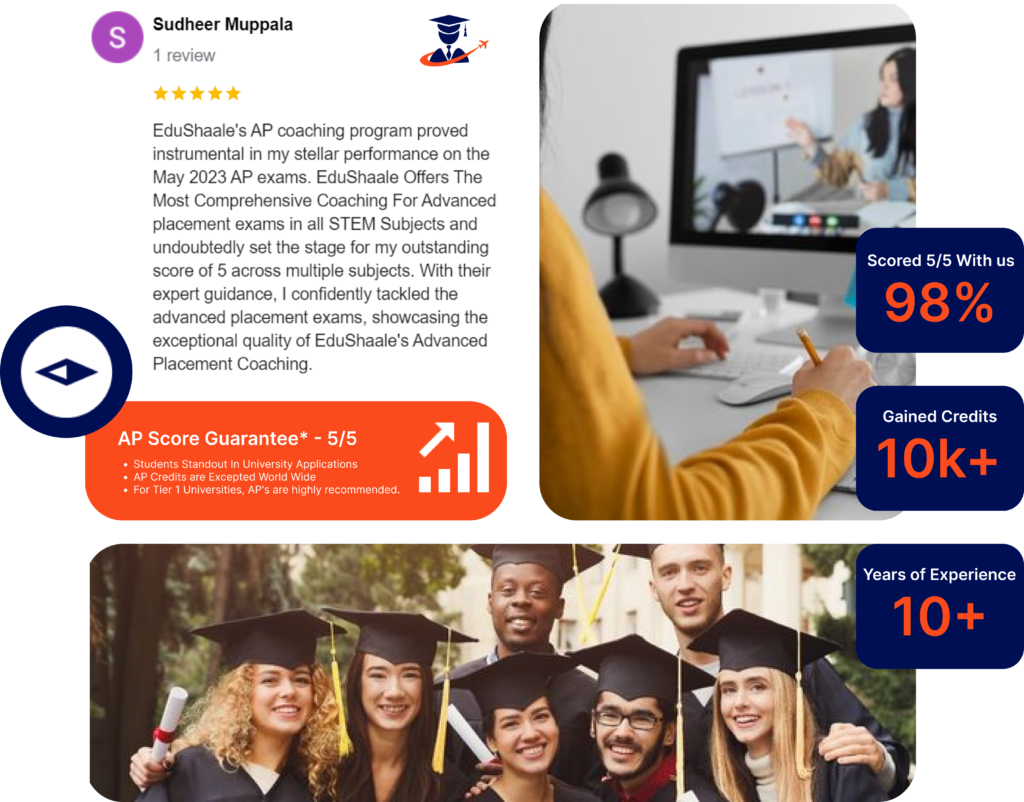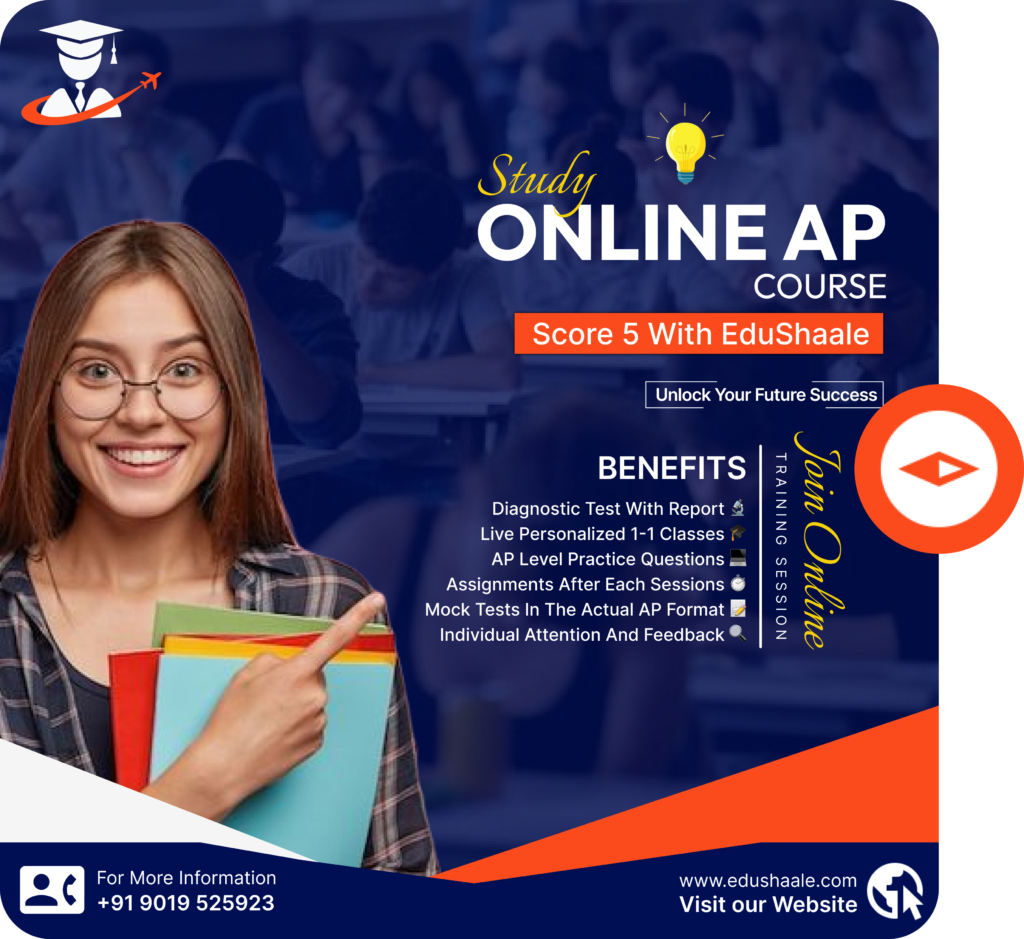AP Calculus BC Classes & Training Online
Are you Looking for the AP Calculus BC Classes? Worry not, EduShaale has got your back
- No credit card required
- Free Demo Session
- Personalized 1-1 Classes
- Flexibile & Affordable


AP Coaching Program
- 1-1 coaching from Certified AP Trainers per subject
- 5000+ Practice Questions and Drills
- 1000+ Question Bank
- 5+ AP Style Mock Tests
- 50+ Topic Based Tests(On Demand Generation)
- 10+ years AP Past Exam Questions
- 20K+ Trusted AP Aspirants
- Parent Connect, Progress Tracking & Regular Follow-up
- 4.9/5 Rated by AP Aspirants
AP Calculus BC Structure
45 questions 1hr 45mins 50% of Score
- Part A: Graphing calculator not permitted (33.3% of score)
- Part B: Graphing calculator required for some questions (16.7% of score)
- Questions include algebraic, exponential, logarithmic, trigonometric, and general types of functions.
- Questions include analytical, graphical, tabular, and verbal types of representations.
6 questions 1hr 30mins 50% of Score
- Part A: 2 problems | Graphing calculator required (16.7% of score)
- Part B: 4 problems | Graphing calculator not permitted (33.3% of score)
- Questions include various types of functions and function representations and a roughly equal mix of procedural and conceptual tasks.
- Questions include at least two questions that incorporate a real-world context or scenario into the question.
Course Content
The AP Calculus BC Exam will assess your understanding of the mathematical concepts covered in the course units, as well as your ability to determine the appropriate formulas and procedures to use to solve problems and communicate your work using the appropriate notations. Parts of the exam allow for the use of a graphing calculator.
Note: You may not take both the AP Calculus AB and Calculus BC Exams in the same year.
Limits and Continuity
You’ll start to explore how limits will allow you to solve problems involving change and to better understand mathematical reasoning about functions.
Topics may include:
- How limits help us to handle change at an instant
- Definition and properties of limits in various representations
- Definitions of continuity of a function at a point and over a domain
- Asymptotes and limits at infinity
- Reasoning using the Squeeze theorem and the Intermediate Value Theorem
On The Exam
4%–7% of exam score
Differentiation: Definition and Fundamental Properties
You’ll apply limits to define the derivative, become skillful at determining derivatives, and continue to develop mathematical reasoning skills.
Topics may include:
- Defining the derivative of a function at a point and as a function
- Connecting differentiability and continuity
- Determining derivatives for elementary functions
- Applying differentiation rules
On The Exam
4%–7% of exam score
Differentiation: Composite, Implicit, and Inverse Functions
You’ll master using the chain rule, develop new differentiation techniques, and be introduced to higher-order derivatives.
Topics may include:
- The chain rule for differentiating composite functions
- Implicit differentiation
- Differentiation of general and particular inverse functions
- Determining higher-order derivatives of functions
On The Exam
4%–7% of exam score
Contextual Applications of Differentiation
You’ll apply derivatives to set up and solve real-world problems involving instantaneous rates of change and use mathematical reasoning to determine limits of certain indeterminate forms.
Topics may include:
- Identifying relevant mathematical information in verbal representations of real-world problems involving rates of change
- Applying understandings of differentiation to problems involving motion
- Generalizing understandings of motion problems to other situations involving rates of change
- Solving related rates problems
- Local linearity and approximation
- L’Hospital’s rule
On The Exam
6%–9% of exam score
Analytical Applications of Differentiation
After exploring relationships among the graphs of a function and its derivatives, you’ll learn to apply calculus to solve optimization problems.
Topics may include:
- Mean Value Theorem and Extreme Value Theorem
- Derivatives and properties of functions
- How to use the first derivative test, second derivative test, and candidates test
- Sketching graphs of functions and their derivatives
- How to solve optimization problems
- Behaviors of Implicit relations
On The Exam
8%–11% of exam score
Integration and Accumulation of Change
You’ll learn to apply limits to define definite integrals and how the Fundamental Theorem connects integration and differentiation. You’ll apply properties of integrals and practice useful integration techniques.
Topics may include:
- Using definite integrals to determine accumulated change over an interval
- Approximating integrals with Riemann Sums
- Accumulation functions, the Fundamental Theorem of Calculus, and definite integrals
- Antiderivatives and indefinite integrals
- Properties of integrals and integration techniques, extended
- Determining improper integrals
On The Exam
17%–20% of exam score
Differential Equations
You’ll learn how to solve certain differential equations and apply that knowledge to deepen your understanding of exponential growth and decay and logistic models.
Topics may include:
- Interpreting verbal descriptions of change as separable differential equations
- Sketching slope fields and families of solution curves
- Using Euler’s method to approximate values on a particular solution curve
- Solving separable differential equations to find general and particular solutions
- Deriving and applying exponential and logistic models
On The Exam
6%–9% of exam score
Applications of Integration
You’ll make mathematical connections that will allow you to solve a wide range of problems involving net change over an interval of time and to find lengths of curves, areas of regions, or volumes of solids defined using functions.
Topics may include:
- Determining the average value of a function using definite integrals
- Modeling particle motion
- Solving accumulation problems
- Finding the area between curves
- Determining volume with cross-sections, the disc method, and the washer method
- Determining the length of a planar curve using a definite integral
On The Exam
6%–9% of exam score
Parametric Equations, Polar Coordinates, and Vector-Valued Functions
You’ll solve parametrically defined functions, vector-valued functions, and polar curves using applied knowledge of differentiation and integration. You’ll also deepen your understanding of straight-line motion to solve problems involving curves.
Topics may include:
- Finding derivatives of parametric functions and vector-valued functions
- Calculating the accumulation of change in length over an interval using a definite integral
- Determining the position of a particle moving in a plane
- Calculating velocity, speed, and acceleration of a particle moving along a curve
- Finding derivatives of functions written in polar coordinates
- Finding the area of regions bounded by polar curves
On The Exam
11%–12% of exam score
Infinite Sequences and Series
You’ll explore the convergence and divergence behaviors of infinite series and learn how to represent familiar functions as infinite series. You’ll also learn how to determine the largest possible error associated with certain approximations involving series.
Topics may include:
- Applying limits to understand the convergence of infinite series
- Types of series: Geometric, harmonic, and p-series
- A test for divergence and several tests for convergence
- Approximating sums of convergent infinite series and associated error bounds
- Determining the radius and interval of convergence for a series
- Representing a function as a Taylor series or a Maclaurin series on an appropriate interval
On The Exam
17% –18% of exam score
Why us for your AP Calculus BC Classes?
At EduShaale, we take immense pride in our commitment to providing a truly personalized and 1:1 learning experience for each student. Our approach ensures that you receive not just education but individualized attention, targeted guidance, and a learning journey tailored specifically to your unique needs and pace.
Embark on a journey of comprehensive coverage of AP Calculus BC concepts with our program, featuring over 20+ hours of dedicated instruction. Immerse yourself in the subject matter, master essential topics, and build a robust foundation that goes beyond conventional teaching methods.
Recognizing that every student has a unique learning pace, our classes are meticulously paced according to your individual needs. This flexibility empowers you to grasp concepts thoroughly, ensuring a comfortable progression through the curriculum.
Homework assignments form an integral part of our program. Upon completing each unit, engaging homework is provided to reinforce your understanding and allow you to apply the knowledge acquired in a practical context.
We are unwavering in our commitment to ensuring that your doubts and questions are promptly addressed. Benefit from our unlimited doubt classes, providing you with ample opportunities to seek clarification and bolster your confidence in your understanding of the subject.
This invaluable opportunity allows you to analyze your performance, gain insights into your mistakes, and refine your test-taking strategies under expert guidance.
Collaboration among educators, students, and parents is pivotal for academic success. Experience the benefits of regular Parent-Teacher Meetings, where we discuss your progress, share insights, and address any concerns. This collaborative approach creates a supportive learning environment that goes beyond the ordinary.
Score A Perfect 5/5 on AP
We're so confident that you'll be happy with our coaching that we offer a 100% satisfaction guarantee.
P.S. We're currently offering a special discount to new students.
